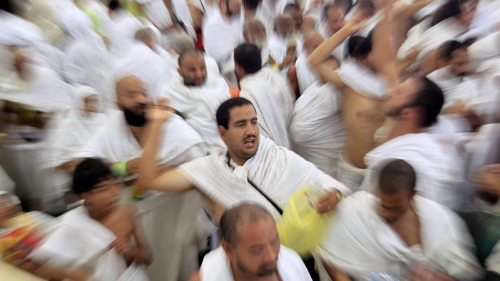Why Believers’ Sins Are All Forgivable

[vc_row][vc_column][vc_column_text]It is a matter of fact that, apart from Prophets, all people are fallible and sinners, one way or another. The good news, however, is that man is created as a pure and innocent being, that he is predisposed to appreciating and doing good and that he intrinsically despises evil, that virtue preponderates over evil, that both good and bad are self-evident and the paths leading to them are clearly defined, and that, at the end of the day, there is Almighty God who is All-Compassionate, All-Merciful and Ever-Forgiving.
These constitute a part of the ontological and spiritual laws according to which life has been created and according to which the existence of man - in his capacities as God’s vicegerent on earth and the raison d’etre of life - unfolds. They are integral to the sunnatullah (the way God created and administers the universe).
Which means that the presence of sins on earth is normal. Abnormal would be the total absence of wrongdoing. Equally anomalous, unworkable and even counterproductive would be if a person or a society starts dreaming of a time and a state when infallibility will prevail. Positively, there can be neither perfection, nor flawlessness, in this world. Such things are but illusions.
Thus, utopianism as a form of excessive idealism is not pursued by Islam. Realism, rooted in utmost pragmatism and matter-of-factness, is the way. The hierarchies of life realities, at the heart of which resides man with his noble terrestrial mission and purpose, are to be perceived and dealt with exactly as they are, with neither adding to nor subtracting from them.
This, nonetheless, is only one side of the dynamics of life. The other side is that man cannot operate alone. So weak and vulnerable has he been created that at every stage of his terrestrial journey he needs his Creator to make it through. Otherwise, man is bound to lose his way, exacerbate his weaknesses and aggravate his limitations, and, in the end, be consumed by the advancing power of sin.
Man furthermore needs the guidance of his Creator, for it is Him who created man and knows best what he needs to stay the course and succeed. It is only God who can optimize the potentials of man and defuse his disadvantages. Man-made substitutes can never be adequate to rule the roost, because whatever man produces, be it in the realm of thought or real life, is as flawed as his entire being. Pageantry is as short-lived as it is artificial and shallow, thereby exhibiting the full existential package of man.
Lastly, a believing man must become an active protagonist. His inborn revulsion against evil is to be translated into action. Incessantly, he should try to stay away from sin and from all contexts, as well as paths, that may drag him into it. Under no circumstances should he be turned into a supporter of evil and a partisan of sinners. He should be sufficiently educated, sensible and ever-vigilant. He should not only steer away from sin, but also should help others as much as he can to follow his example.
Believers and sins
If and when due to the working of the physical and metaphysical vicissitudes of life a believer succumbs to the advances of sin, he should not feel defeated or lose heart. He should do the following as an alternative.
No sooner does a sin “touch” a believer and he sins, than he ought to start feeling ashamed and blameworthy. He needs to have a feeling of betrayal and let down, which in turn should lead to a condition of restlessness.
What a believer has just done is not compatible with his soul and consciousness, so he ought to get on the offensive. In this unprecedented situation – and relationship - he ought to be the subject and the sin committed the object. A sin is to be seen as a discordant and hence, unwelcome extraneous element, which must be eliminated at once. A believer next needs to repent to God most sincerely, affirming that he abhors what he has done and vowing that he will never do it again
However – by way of conjecture - if the reverse happens, that is, if a sin becomes the subject and a sinner the object, such a possibility is destined to spell trouble and indicate that sin has found a home and has started to overwhelm a person. In the latter scenario, getting rid of a sin becomes ever more difficult. Wrongdoing becomes a passion and a lifestyle, and its home-person its receptacle and locus of operation. Sin and sinner become assimilated. They turn out to be one, in which case sin moulds its person in its own image.
When committing a sin in this manner, a believer should not despair, since he knows that he did not intend to rebel against the holy authority and revealed word of his Creator and Lord. He did not switch allegiance. Rather, a believer knows that his sin was a momentary lapse of spiritual concentration and judgment. It was a demonstration of his weaknesses and flaws. It was a sign of his humanness.
A believer errs because he is a human being subjected to all the ups and downs of this fleeting world. To commit a sin, it follows, is to be human. Moreover, to conquer a sin and genuinely repent signifies that a person’s heavenly dimension has triumphed and has commenced to reign supreme over his aggregate personality, whereas being conquered by a sin and never feeling remorseful, nor asking forgiveness, indicates that a person’s earthly-cum-animalistic dimension - with the help of Satan’s pretexts of course - has taken control of his self.
It stands to reason that a believer does not sin in the conventional significations of the word, in the sense defiant non-believers do, for example. Accordingly, a believer cannot be bent on transgressing within the framework of a premeditated perversion and systematic misconduct of his, or else his status as believer will be undermined. Nor does he break the spiritual and moral rules for the sake of breaking them, or because he was given to feeling and acting all high and mighty.
Instead, a believer does sin sporadically because he slips, commits an error and makes wrong steps. He finds himself in the wrong place at the wrong time, worsening his inherent inadequacies and provoking himself into making momentary bad choices and arriving at momentary wrong decisions. A believer’s misdeeds are one-off, rather than regular, occurrences. They are not his routines. They are exceptions to the rule of righteousness that comprises his standards of living.
It is no coincidence that in Arabic repentance (tawbah) means “returning”, that is to say, to regret and willingly return from the path of disobedience to that of submission and conformity. It also means that a believer, when repenting, returns to the range of the divine love and care, which were intended for him all along. He returns to the purity and goodness of his primordial self as well. Like so, lesser “returns” to sin prompted far greater “returns” to heavenly joy.
The Qur’an and Sunnah on sin and repentance
That is why Prophet Muhammad (peace and blessings be upon him), while emphasizing this life paradigm, said: “By the One in whose Hand my soul is, were you not to commit sins, Allah would replace you with a people who would commit sins and then seek forgiveness from Allah; and Allah would forgive them” (Sahih Muslim).
The Prophet likewise said: “Every son of Adam commits sin, and the best of those who commit sin are those who repent” (Sunan Ibn Majah).
“The one who repents from sin is like one who did not sin” (Sunan Ibn Majah).
The Qur’an is also replete with references to these truths. For example, Allah says: “Say (O Muhammad): ‘O My servants who have transgressed against themselves (by sinning), do not despair of the mercy of Allah. Indeed, Allah forgives all sins. Indeed, it is He who is the Forgiving, the Merciful’” (al-Zumar, 53).
“Indeed, Allah does not forgive association with Him, but He forgives what is less than that for whom He wills. And he who associates others with Allah has certainly fabricated a tremendous sin” (al-Nisa’, 48).
At one place, Allah yet describes the righteous, the pious and the doers of good as the ones who when they “commit an immorality or wrong themselves (by transgression), remember Allah and seek forgiveness for their sins - and who can forgive sins except Allah? - and (who) do not persist in what they have done while they know” (Alu ‘Imran, 135).
The question, therefore, is not whether the most outstanding believers could commit an act of immorality or could wrong themselves by committing a sin – which is obviously so – but how they react afterwards. What is stipulated is that the sinning believers collect themselves and remember Allah, seek forgiveness from Him for the committed immoralities, and that they remain true to themselves and do not knowingly persevere in the disgraceful acts.
This could be called the “ethics of sinning”, which, despite the repulsive nature of immorality, is fully permeated with the spirit of the Islamic message. So much so that it yet could be asserted that whatever a true believer does – including the problematic matters - he does in accordance with the implications of tawhid (believing in, affirming and living in conformity with the Oneness of God). A believer sins in the spirit of tawhid, too.
The entire process of provisional sinning and repenting (returning) – which in turn may bring about an increase in piety and overall goodness – can become extraordinarily meritorious, to the point that a person’s evil deeds may be not just forgiven, but also replaced with good ones. Allah promises: “Except for those who repent, believe and do righteous work. For them Allah will replace their evil deeds with good. And ever is Allah Forgiving and Merciful” (al-Furqan, 70).
As a result, in the vocabulary of the Qur’an, the true meaning of sin and sinner is to voluntarily earn evil and to eventually become encompassed by it (to be fully and irreparably engulfed in evil): “Those are the companions of the Fire; they will abide therein eternally” (al-Baqarah, 81).
By way of illustration, these three Qur’anic instances present the Islamic philosophy of sin, repentance and forgiveness.
The case of Prophet Adam
First, Prophet Adam is said to have “disobeyed his Lord and went astray” (Ta Ha, 121). However, although Adam disobeyed God, he was not a disobedient person, and although he erred and went astray (from God’s command), his by no means were the wicked thought and behavioural designs.
This was so owing to the fact Adam erred in Paradise (Jannah). He was placed temporarily there partly in order to learn and get prepared for his impending mission on earth. While at the same time it is an undeniable fact that committing mistakes while learning is not deemed a failure. Those mistakes are part of dynamic productive processes and as such can easily be converted into advantages. They are part of a learning curve. Everything that transpired in Paradise was geared towards the maximization of Adam’s performances on earth where things really mattered and where Adam ultimately rose to the occasion.
In addition, as soon as Adam realized what had happened, he felt deeply apologetic and repented to God, declaring: “Our Lord, we have wronged ourselves, and if You do not forgive us and have mercy upon us, we will surely be among the losers” (al-A’raf, 23). Adam thus restored and returned to the original order of things.
Thus, when referring to what had exactly happened, the Qur’an tells that Adam and his wife Hawwa’ were simply caused to slip, and so, err, by Satan who tricked them by capitalizing on their human innocence, naivety and existential inexperience. Satan stopped at nothing in doing so. At the end of the day, though, neither Adam’s seeming disobedience, nor his propensity for sin, was to be blamed for the Paradise debacle. It was Satan who, while inducing Adam and Hawwa’ to “slip”, exhibited his true colours and for whom later on earth - the place of human trials - Adam was more than ready.
Due to the experiences of Adam and his wife in Paradise, their descendants until the Day of Judgment were handed a blueprint for successfully confronting Satan and overpowering sin.
The case of Qabil
Second, when Qabil, one of Adam’s sons, killed his brother, Habil, the Qur’an laid the blame at Qabil’s door. The Qur’an does not bring the deceptions of Satan into the picture. Instead, it says that Qabil’s corrupted and evil soul had prompted and had facilitated to him one of the most monstrous crimes a human being can perpetrate (al-Ma’idah, 30).
Undoubtedly, the advances of Satan had been accepted and were subsequently worked on internally inside the person of Qabil. His self thence became the centre of operations, so to speak, functioning as Satan’s proxy. As if the Qur’an wanted to bypass the role of Satan (external components) and, in its place, wished to focus on the crux of the matter (internal components).
Qabil was not just evil, but also a personification of evil. He was blinded by it. He could not see, nor listen to, anything but his evil self and its inner voices. As such, to Qabil there was nothing aberrant in his crime. His self was home to all the prerequisites needed for the sin he contemplated and then carried out. The crime of murder sought and found Qabil, as much as his self had sought and found the murder. They were a match made in heaven.
And that was the reason why Qabil killed his brother in cold blood. He never remembered God, before, during and after the execution of the murder, nor did he ever realize the severity of his misdeed for which he could repent. He was consumed and controlled by his wickedness throughout.
If Adam and his “wrongdoing” was a model for believers, Qabil certainly was a model for the evil-doers of all times and circumstances. The Prophet captured this moral when he said: “No soul is wrongfully killed but that some responsibility for its blood is upon the first son of Adam (Qabil), for he was the first to set the precedent of murder” (Sahih al-Bukhari and Sahih Muslim).
The Qur’an employs the Qabil-versus-Habil incident to underscore a similar spiritual and ethical import: “Because of that (Qabil’s murder of Habil), We decreed upon the Children of Israel that whoever kills a soul unless for a soul or for corruption (done) in the land – it is as if he had slain mankind entirely. And whoever saves one – it is as if he had saved mankind entirely. And our messengers had certainly come to them with clear proofs. Then indeed many of them, (even) after that, throughout the land, were transgressors” (al-Ma’idah, 32).
A son of Prophet Nuh (Noah)
Third, the Qur’an highlights the case of a son of Prophet Nuh as another example of the true meaning of sin and sinner. Considering that the man in question lived during the early phases of human civilization, it is safe to say that he – just like Qabil – was a trendsetter. He became famous for all the wrong reasons.
This son of Prophet Nuh spent his entire life rejecting his father’s teachings and trying to rival the latter’s way of life (even proclaiming at the height of the flood calamity that, instead of following his father onto the ship and to safety, he will take refuge on a mountain to protect him from the water (Hud, 43)). In the end, the son died in such a rebellious state, deserving the Qur’anic description of himself as not a member of Nuh’s family and as a “conduct or work” that is not righteous (Hud, 46).
Nuh’s son appears to have scaled all the levels of sin. Not only did he allow Satan and his evil self (soul) to get the better of him, but he as well became a quintessence of all sin and transgression. Becoming synonymous with evil, he was termed a “sinful deed”. Thus, his legacy as an epitome and image of sin was immortalized. In addition to living and promoting evil, correspondingly he became evil incarnate.
Just like in the case of Qabil, the senses of Nuh’s son were incapacitated. Such was his absorption in sin that he could not reason properly, resulting in neither guilty conscience nor repentance to be ever forthcoming. The impact of the miraculous episodes, which were associated with his father’ prophethood and which defied both human intelligence and physical laws, evaded him. His condition was proving suicidal at all levels, prompting Prophet Nuh to warn him, in his role as prophet, and to implore him, in his role as his father: ‘“This day there is no saviour from the decree of Allah except him on whom He has mercy.’ And a wave came in between them, so he (the son) was among the drowned” (Hud, 43).
It is this pattern of people that persist in sinning and do not understand the motives – nor needs – for repentance. It is them furthermore that will be denied the mercy and forgiveness of the All-Merciful and Ever-Forgiving God – if He so wills – and will be subjected to an appropriate punishment in the Hereafter.
Believers, on the other hand, will be spared this agony, for inasmuch as their sins are forgivable, they will be forgiven. Their sins are at once minimal, relative and conditional, and stand no chance of continued existence when juxtaposed with the absolute and infinite compassion, forgiveness and clemency of Almighty God.
Harbouring any different idea is alien to the Islamic worldview, and is unacceptable. To despair of the relief of God and His mercy is a sign of weak faith. Yet it could be a sign of a total loss of faith both in God and the self.
So, therefore, repentance in Islam is more of a qualitative than quantitative nature. It is a state of mind and soul. It is a validation of allegiance and spiritual authenticity. A believer repents as much because of his sins as because doing so is an act of remembrance of God. Repentance moreover denotes a critical act of worship whereby one practices gratitude and enhances a spiritual fortitude within himself.
To repent is to blot out sins and to generate preventive measures for the future. Repentance is a great and proven deterrent. If conceived and practiced properly, it can make notable contributions to the self-development and self-actualization processes as well as methods.
For these reasons are Muslims encouraged to repent when they sin and when they do not. They are urged to take the whole thing into their personal and collective stride. The Prophet set an example when he said, even though he was a perfect being and his deeds infallible: “By Allah, I ask for forgiveness from Allah and turn to Him in repentance more than seventy times a day” (Sahih al-Bukhari).[/vc_column_text][/vc_column][/vc_row]
Topics: Believers, Forgiveness, Hajj Values: Spirituality Channel: Hajj - Day 5
Views: 2548
Related Suggestions





















